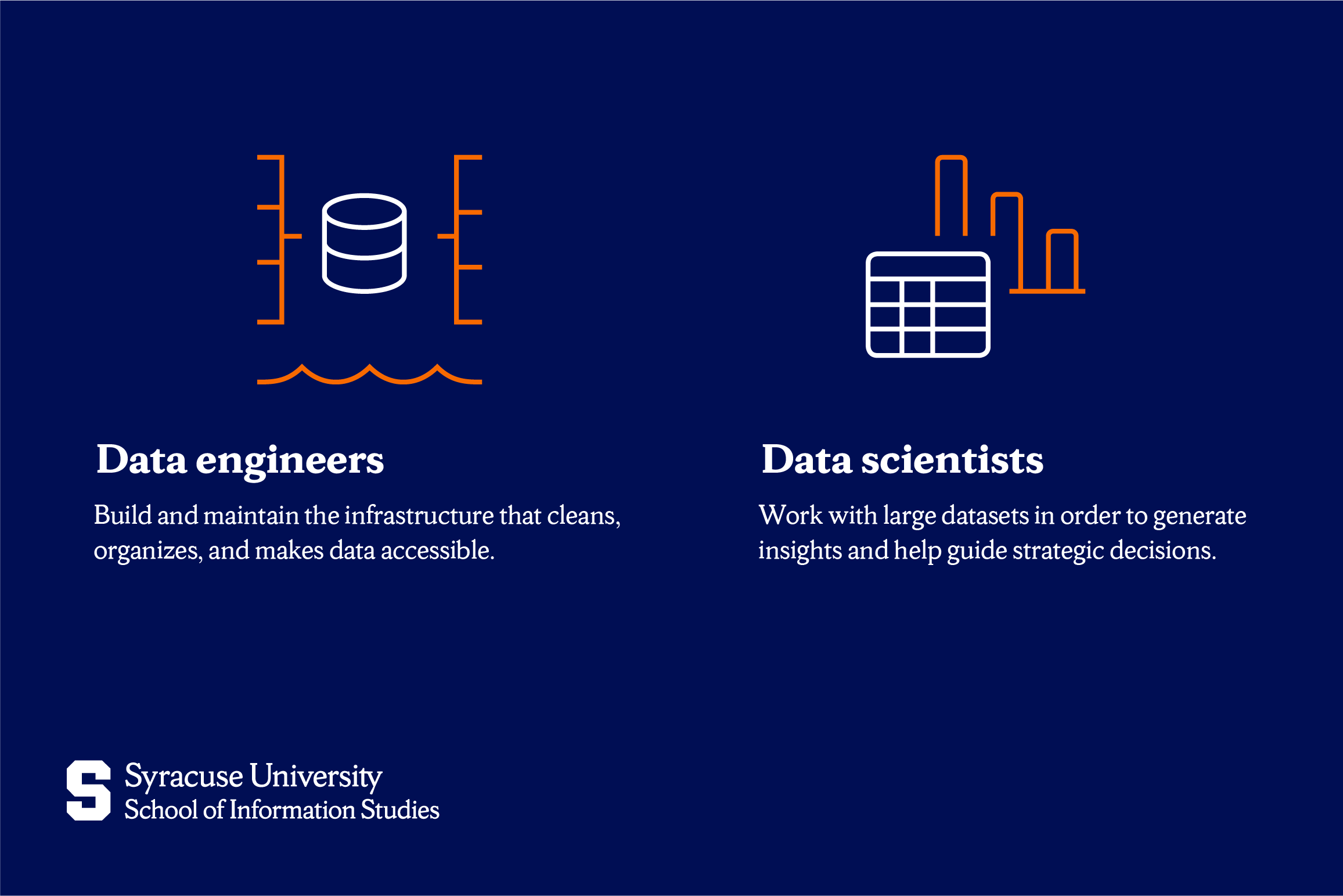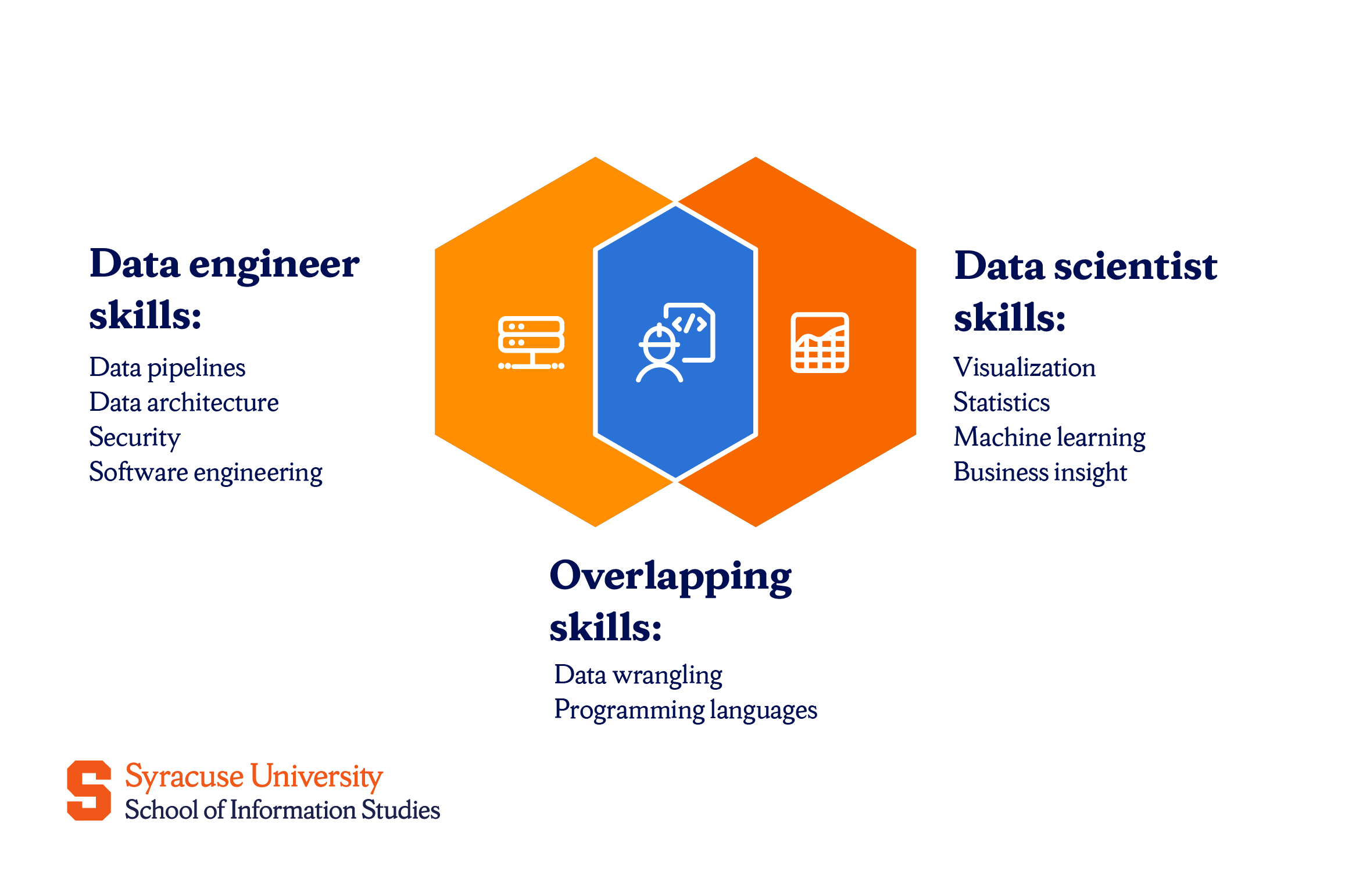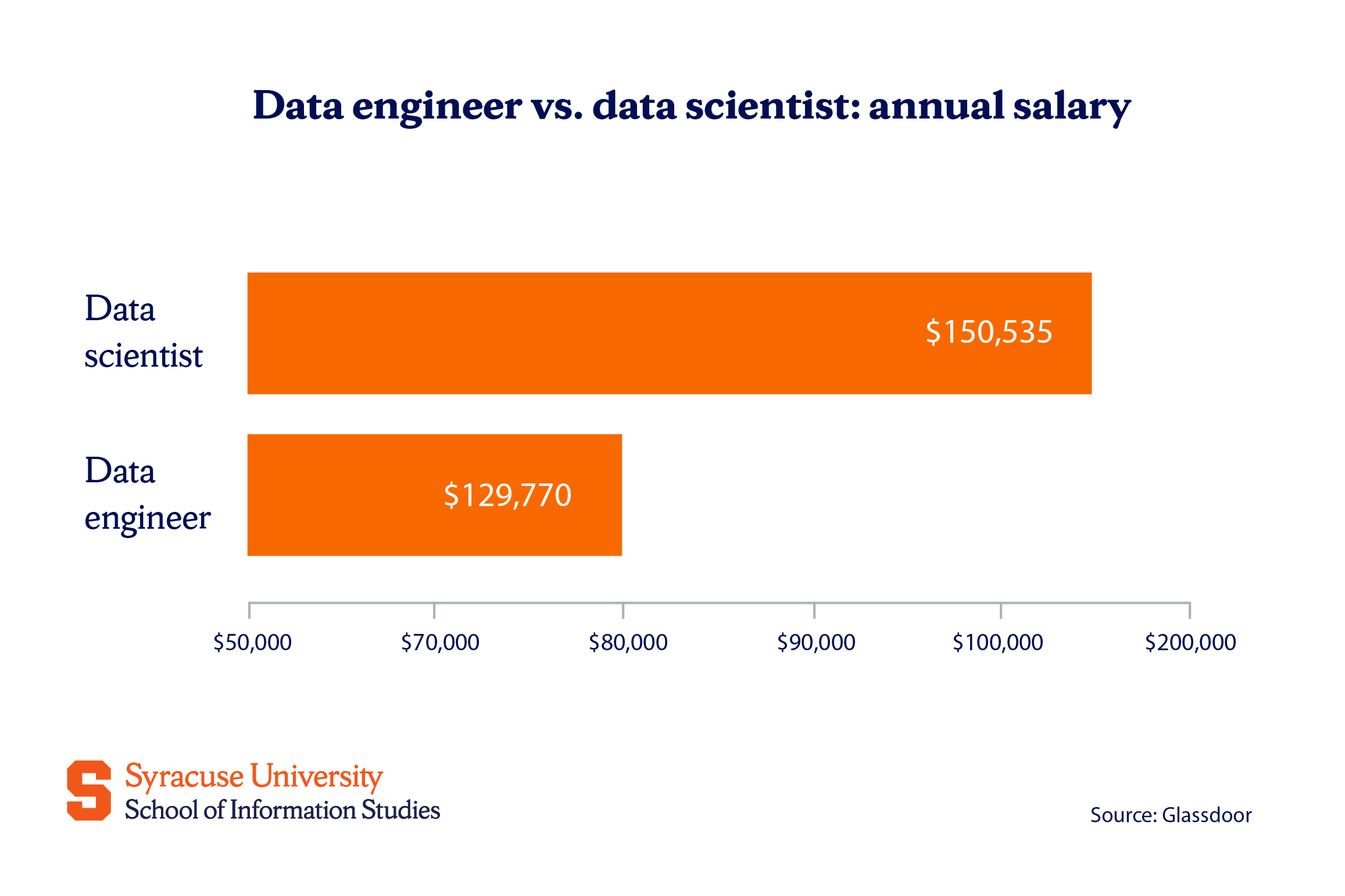Key Takeaways
- Data engineers build and maintain the infrastructure that cleans, organizes, and makes data accessible.
- Data scientists work with large datasets in order to generate insights and help guide strategic decisions.
- While data scientists focus on interpreting data and applying statistical models, data engineers are concerned with scale, reliability, access control, and performance.
By 2028, the world is expected to generate over 394 zettabytes of data. Within this massive volume, only a fraction holds meaningful value—but when properly processed and analyzed, that data can support business decisions, reveal trends, and provide solid evidence for action.
To reach that point, data must go through several stages of transformation, handled by different professionals along the way. Two of the most critical roles in this process are data scientists and data engineers. While both work closely with data and aim to extract value from it, a closer look at data engineers vs. data scientists reveals that their roles and skill sets serve distinctly different purposes.
What Does a Data Engineer Do?
Data engineering as a discipline is focused on building and then maintaining the systems that enable the collection and organization of data. While data may come from dozens of different sources, like apps, sensors, websites, and transactions, it rarely arrives in a clean or usable form. Therefore, data engineering is used to make that data accessible and transform it into the right format for analysts and data scientists to work with.
Data engineers create the infrastructure that supports effective data use. Their responsibilities often include:
- Building and maintaining data pipelines that collect information from various sources and deliver it to centralized storage systems.
- Cleaning, transforming, and organizing data so it follows consistent formats and can be processed efficiently.
- Developing tools and systems that generate, monitor, or manage data across platforms such as apps, sensors, and online services.
- Setting up and managing storage environments like data warehouses or cloud-based systems.
- Enforcing data governance standards, including access controls and ethical handling.

What Does a Data Scientist Do?
Once the data is cleaned and ready, data scientists take over. Their discipline centers on analyzing and interpreting the data that data engineers provide in order to find meaningful patterns and use them to support decision-making. It blends statistical thinking with analytical problem-solving to help organizations understand what’s happening, why it’s happening, and even what might happen next.
While the data itself may come from different sources and be prepared by other specialists, data science is about unlocking its value through exploration, modeling, and interpretation. Therefore, the responsibilities of a data scientist include:
- Analyzing data to uncover patterns and relationships.
- Building models and simulations to predict outcomes or test ideas.
- Running experiments and comparing results to see what works best in a given scenario.
- Visualizing complex information in charts, graphs, and dashboards that make findings easier to understand.
- Collaborating with business, product development, or management teams to explain insights and recommend actions.
- Refining and improving their models based on feedback, new data, or changing goals.
Difference Between Data Engineer and Data Scientist
The line separating data scientists from data engineers isn’t always clear. This is mainly because “data science” can be used as an umbrella term that sometimes includes data engineering as a subfield. In many settings, the responsibilities of data engineers feed directly into the work of data scientists, thus leading to overlap.
That said, a useful distinction can still be made based on the general definitions discussed earlier: the data engineer ensures data is accessible and well-structured; the data scientist applies statistical and machine learning techniques to extract meaning. One role is infrastructure-oriented, while the other is analysis-driven.
Despite the connection between the two, they also differ in terms of education paths, core skills, technologies, and job market trends.
Education and certifications
Generally, data engineers often hold degrees in computer science, software engineering, or information systems, where the focus is on systems architecture, distributed computing, cloud infrastructure, and advanced database management. Their education focuses on building scalable systems and handling large volumes of data.
Many also choose to earn certifications from platforms such as AWS or Google Cloud in order to deepen their expertise in managing data pipelines and cloud-based processing.
Data scientists, on the other hand, are more likely to come from academic backgrounds in statistics, applied mathematics, physics, economics, or formal data science and analytics programs. Their studies lean heavily toward data modeling, statistical inference, and experimental analysis.
Many also pursue advanced degrees, such as a master’s or PhD, particularly when their roles involve designing predictive algorithms or conducting in-depth research. Certifications in machine learning, Python for data analysis, and tools like TensorFlow or scikit-learn are also common in their professional development.
Skills
While both roles revolve around data, the skills they emphasize are quite different. Data engineers specialize in building the systems that move and organize data; therefore, their skillset centers on the following:
- Designing and managing data pipelines
- Structuring databases and data lakes
- Data cleaning and transformation
- Writing efficient, production-ready code
- Understanding data security and access control
- Strong background in software engineering concepts

Meanwhile, data scientists focus on analyzing that data to extract meaning. Their key skills include:
- Exploratory data analysis and visualization
- Hypothesis testing and experimentation
- Statistical modeling
- Machine learning and feature engineering
- Interpreting and communicating data insights
- Business acumen and data storytelling
In smaller teams, one person may even perform both roles, although this is becoming less common as companies grow.
Tools and technologies used
The tools and technologies used in each role point to their differing priorities. Data engineers rely on systems that support large-scale, reliable data processing. Their toolkit often includes the following:
- SQL – to access and manage data
- Apache Spark – to process large data sets quickly
- Apache Airflow – to schedule and automate data tasks
- Hadoop and Kafka – for storing and streaming big data
- ETL tools – for cleaning and preparing data before it’s used
- Databases like PostgreSQL, MongoDB, and BigQuery
- Cloud platforms such as AWS, Azure, and Google Cloud
Data scientists, in contrast, use tools designed for statistical analysis, modeling, and visualization. These include:
- Python and R – programming languages for analysis
- Pandas, NumPy, Scikit-learn, and TensorFlow – for data analysis and building models
- Jupyter Notebooks – for writing code and viewing results step-by-step
- Matplotlib, Seaborn, and Tableau – for visualizing data
- SQL – to get the data they need from databases
Since data scientists frequently depend on the infrastructure data engineers build, the two roles often work together within the same platforms and environments.
Salaries and job outlook
According to the U.S. Bureau of Labor Statistics, employment in data science is projected to grow by 34% from 2023 to 2033. This reflects the growing demand for professionals who can collect, structure, and extract insights from data across nearly every industry. Because data engineering is often considered part of the broader data science field, this projection also reflects rising demand for data engineers and other related positions.

In terms of compensation, both careers offer strong earning potential. The estimated total pay for a data engineer is $129,770 annually, with an average base salary of $104,983. Data scientists typically earn even more, with an estimated total pay of $150,535 and an average salary of $113,901 per year.
Which Role Is Right for You?
Choosing between becoming a data engineer or a data scientist starts with understanding how you prefer to think and work. Both roles are important in handling and making sense of data, but they approach the task from different angles.
If you enjoy building systems, making things run efficiently, and working behind the scenes to keep data flowing smoothly, you may be more suited for data engineering. Data science might be a better fit if you prefer analyzing patterns, making predictions, and helping shape business strategies with data.
To help you decide, consider:
- Do you prefer solving problems related to structure or strategy?
- Are you more comfortable working with infrastructure or insights?
- Would you rather design tools for others or use those tools to ask questions?
- Do you enjoy writing production-grade code more than experimenting with models?
Both paths are valuable, and neither is set in stone. You can explore each through beginner projects or short courses, and many professionals shift focus as their interests evolve. The important part is starting somewhere.
When weighing career paths, it’s not uncommon to wonder which role will stretch you more and in what ways. Difficulty, though, often comes down to the kind of problems you enjoy solving and the pace you’re comfortable with.
Data engineering focuses more on systems design, reliability, and large-scale problem-solving. Data science leans into ambiguity, statistical thinking, and interpreting results. One is not harder than the other—they simply demand different strengths. Choose based on how you like to work and know that your path can remain flexible.
Choosing Your Data Future
While the responsibilities of these two roles may overlap in some teams, their focus remains distinct: engineers build the data foundation, and scientists explore what’s possible with it. Whether your strengths lie in structured systems or open-ended problem-solving, there’s a place for you in this field and opportunities to move between roles as your interests grow.
Syracuse University’s iSchool offers two options for those interested in a data-focused career. The Master of Applied Data Science is a full graduate degree that prepares students for roles like data scientist, machine learning engineer, or AI specialist, with a strong emphasis on applied projects and industry-relevant skills.
For those looking to build foundational expertise or upskill without committing to a full degree, the Certificate of Advanced Study in Data Science offers a more flexible, targeted introduction to core data concepts—ideal for professionals adding data skills to an existing career.
Frequently Asked Questions (FAQs)
Can a data engineer become a data scientist (and vice versa)?
Of course! Many professionals transition between the two with additional learning and project experience, especially since they share some foundational skills.
Is data engineering harder than data science?
Not necessarily—it depends on your strengths. Data engineering is more technical and infrastructure-focused, while data science emphasizes analysis and interpretation.
